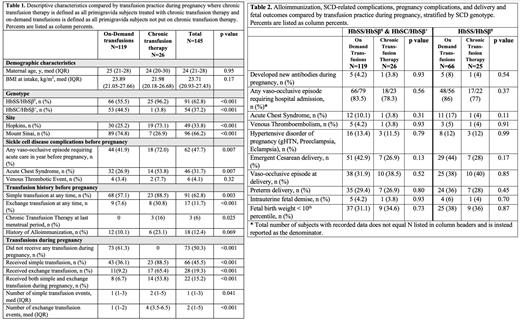Introduction
Despite exceptional maternal morbidity and mortality risk, people with sickle cell disease (SCD) lack firm indications for chronic transfusion therapy (CTT) during pregnancy. Alloimmunization may cause hemolytic transfusion reactions and can limit the safety of future blood transfusions; thus it is a rationale for restricting CTT during pregnancy. Little data quantifies this risk. The 2020 American Society of Hematology (ASH) Guidelines for SCD Transfusion Support recommend CTT in some pregnancies, but adoption in clinical practice is unknown.
This study's purpose is to use a large two-center SCD pregnancy cohort to describe alloimmunization rates in SCD pregnancies treated with CTT vs on-demand transfusion (ODT) and to determine the fraction of SCD pregnancies meeting the ASH Guideline to initiate CTT in pregnancy.
Methods
We reviewed SCD pregnancies delivered at Mt. Sinai Hospital, Toronto (1990-2017) and Johns Hopkins Hospital (2000-2021). We collected data on transfusions and SCD complications before and during pregnancy, delivery, and fetal outcomes.
Analyses classified subjects and pregnancies as receiving CTT or ODT. We defined CTT as pregnancies treated with scheduled, prophylactic transfusions; ODT as pregnancies transfused as-needed, including no transfusions. Sinai routinely matched transfusions for Rh and K antigens while Hopkins matched Rh only. Both centers provided extended matching if an alloantibody was detected.
The first analysis included singleton pregnancies to primigravida subjects. We compared new alloantibody development, SCD complications, and pregnancy outcomes in CTT vs. ODT groups and in genotype stratified groups. We used Chi-squared and Wilcoxon rank-sum tests for categorical and continuous variables; p < .05 was significant.
The second analysis included all cohort pregnancies and identified which met criteria for CTT per ASH Transfusion Guidelines which advise CTT for (A) severe SCD complications before or during pregnancy here defined by acute chest syndrome (ACS) or pain requiring acute care in the year before or during pregnancy, any history of venous thromboembolism (VTE), stroke, or multi-organ failure or (B) features of high-risk pregnancy, defined by multiple gestation, pre-eclampsia, gestational hypertension, cardiac comorbidities, or preterm labor history.
Results
Among 145singleton, primigravida pregnancies, more received ODT than CTT (119 ODT vs 26 CTT). Among ODT subjects 46/119 received at least one transfusion during pregnancy.
CTT subjects had more severe SCD than ODT subjects before pregnancy (Table 1). During pregnancy, SCD severity did not differ (Table 2).
Before pregnancy, 18 subjects were alloimmunized and did not differ by treatment group (6/26 CTT vs 12/119 ODT, p=0.07). During pregnancy, six subjects developed an alloantibody and did not differ by treatment group (1/26 CTT vs 5/119 ODT, p=0.93). Half (3/6) had a history of alloimmunization before pregnancy (1 CTT vs 2 ODT, p=0.27) and three did not (0 CTT vs 3 ODT, p=0.27). All subjects with new antibodies during pregnancy and historic alloimmunization developed anti-K antibodies (1 CTT, 2 ODT) at both sites. Those without alloimmunization history developed anti-Jkantibodies (3 ODT) at Sinai.
In the secondary analysis, we included 299 pregnancies to 203 subjects. Among them, 249 pregnancies (83%) met at least one ASH Guideline criteria for initiating CTT. This included all CTT pregnancies (61/61, 39 subjects) and 79% of ODT pregnancies (188/238, 164 subjects), 46% of which received at least one transfusion during pregnancy (86/188).
Conclusions
In this SCD pregnancy cohort, alloimmunization rates were low and did not differ between those treated with CTT versus ODT. As alloimmunization events were inconsistent with institutional matching practices, new antibody development may be attributable to transfusions from outside hospitals or pregnancy-associated alloimmunization. Antigen matching per ASH Transfusion Guidelines avoids C, E, K and Jk alloimmunization. Scheduled transfusions may reduce emergency transfusion which increases alloimmunization risk. Finally, all CTT and 79% of ODT pregnancies met ASH Guideline criteria for CTT in pregnancy, however the cohort predates ASH Guideline publication. Guideline adherence may lead to increased use of CTT during pregnancy. More discriminating tools are needed to inform CTT use in SCD pregnancy.
Disclosures
Kuo:Agios Pharmaceuticals: Consultancy, Research Funding; Vertex Pharmaceuticals: Consultancy; Alexion Pharmaceuticals: Consultancy; Pfizer: Consultancy; Novo/Nordisk: Consultancy, Honoraria; Bristol Myers Squibb: Consultancy, Honoraria; Bioverativ/Sanofi/Sangamo: Membership on an entity's Board of Directors or advisory committees; Forma Therapeutics: Consultancy. Lanzkron:HRSA: Research Funding; Imara/Enliven Therapeutics: Research Funding; National Alliance for Sickle Cell Centers: Other: Vice president ; Global Blood Therapeutics: Research Funding; Magenta: Consultancy; Novartis: Consultancy, Research Funding; CSL-Behring: Research Funding; Takeda: Research Funding; PCORI: Research Funding; Bluebird Bio: Consultancy; Teva Pharmaceutical Industries: Current equity holder in publicly-traded company; Novo Nordisk: Consultancy; Pfizer: Consultancy. Pecker:Alexion: Research Funding; Global Blood Therapeutics: Consultancy; Novo Nordisk: Consultancy.


This feature is available to Subscribers Only
Sign In or Create an Account Close Modal